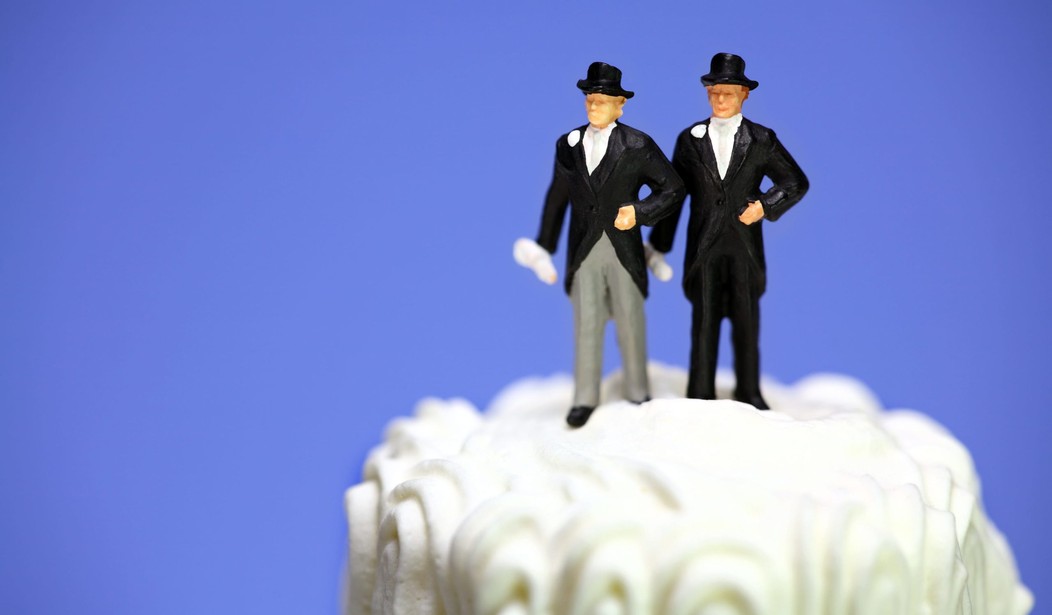The Department of Justice filed an amicus brief in the case of a Colorado baker who refused to sell a wedding cake to a same-sex couple.
Jack Phillips, owner of Masterpiece Cakeshop in Denver, was hauled before the Colorado Civil Rights Commission after refusing to bake a cake for two gay men. At the time, gay marriage wasn’t even legal in Colorado. The couple planned to be married in Massachusetts and come back home to celebrate. The Civil Rights Commission ruled against him, ordering him not only to make cakes for gay couples, but to submit regular reports detailing steps he took to prove he no longer discriminated.
Phillips lost his appeal in the state Supreme Court, but won a hearing before the Supreme Court of the U.S.
“Forcing Phillips to create expression for and participate in a ceremony that violates his sincerely held religious beliefs invades his First Amendment rights in a manner akin to the governmental intrusion in Hurley,” Acting Solicitor General Jeffrey Wall wrote in the brief.
In 1995, the Supreme Court ruled in Hurley v. Irish American Gay, Lesbian, and Bisexual Group of Boston that a private group of citizens organizing a public demonstration could not be compelled by the state government to include other groups whose message was contrary to their own.
“Colorado has not offered, and could not reasonably offer, a sufficient justification for that compulsion here,” the brief reads.
Justice Department officials then argued that the baking of a cake is a service that is a form of expression and is thus protected under the First Amendment. A commercial banquet hall could not refuse to rent its facilities to a same-sex couple for a wedding because that is not expressive, the brief puts forth as an example.
A Justice Department spokeswoman said the brief filed Thursday is one backed by the First Amendment.
“The department filed an amicus brief in this case today because the First Amendment protects the right of free expression for all Americans. Although public-accommodations laws serve important purposes, they — like other laws — must yield to the individual freedoms that the First Amendment guarantees. That includes the freedom not to create expression for ceremonies that violate one’s religious beliefs,” said spokeswoman Lauren Ehrsam.
In 2015, a Colorado appeals court ruled against Phillips, by saying that making the cake “does not convey a message supporting same-sex marriages merely by abiding by the law and serving its customers equally.”
Phillips’ lawyers argued in a prior Supreme Court brief that he “is happy to create other items for gay and lesbian clients,” but that his religion compels him “to use his artistic talents to promote only messages that align with his religious beliefs.”
On the same day the Supreme Court said it would hear Phillips’ case, it also reaffirmed its 2015 decision ruling same-sex marriage as constitutional.
The issue seems simple. As a matter of conscience, an artist is refusing to go against his religious beliefs.
But SCOTUS will have other issues to consider:
This court has a long history of protecting religious expression, but ruling in favor of the baker could be deeply problematic.
If a baker can refuse service to a same-sex couple, someone else would surely come forward to claim a religious right to deny service in the case of interracial or interfaith marriages. The courts would naturally be inclined to object to that. In so doing, they’d essentially be saying that discrimination based on sexual orientation is acceptable while other forms are not.
Do courts really want to get into the business of deciding which forms of discrimination have a legitimate grounding in religious values and which do not?
And do they want to open the door to all manner of religious objection? While the religious freedom cause has been taken up by conservative Christians to register their disapproval of same-sex marriages, others would surely follow. A Muslim business owner, for instance, might refuse to do business with a woman who refuses to wear a burqa or a head scarf.
If the Supreme Court does insist on finding a religious right to deny service, it should do so in the narrowest way possible. One idea might be to find that anyone claiming a religious objection is obligated to find an alternative vendor to provide the requested services.
Actually, I think the Supreme Court is the ideal place to decide “which forms of discrimination have a legitimate grounding in religious values…” That’s what they’re there for. Just because a case would open the door for a whole lot more similar cases doesn’t minimize the vital importance of this particular issue being decided.
But I am a believer in incrementalism — in both legislation and the law. A small step back from the brink by SCOTUS in this case would be a step back toward sanity. The issue is not same-sex marriage. It is religious freedom and in that, the court should always err on the side of conscience.










Join the conversation as a VIP Member